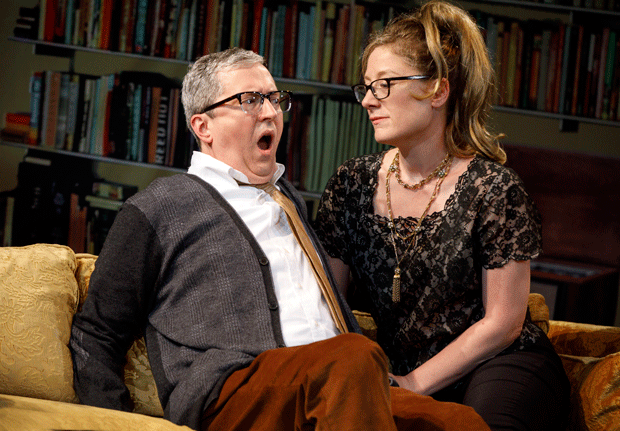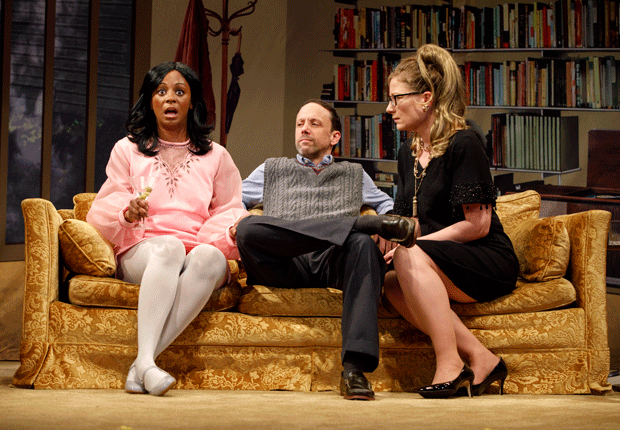The Men Are Not Fine in Everyone's Fine With Virginia Woolf

(© Joan Marcus)
Few female characters of the theater have risen to the iconic status of Martha in Edward Albee's Who's Afraid of Virginia Woolf? Martha — loud, brash, and unwilling to put up with her unambitious husband, George — at first seems like a powerful female force, but ultimately George vanquishes her with a crushing reminder of her failure to live up to society's ultimate expectation for women: motherhood.
Kate Scelsa has a bone to pick with Albee in this regard, and she picks deep in her sidesplitting new comedy Everyone's Fine With Virginia Woolf, now running at the Abrons Arts Center in a production by Elevator Repair Service, the company known for marathon shows like Gatz. At a lean 75 minutes, Scelsa's witty, trenchant parody of Albee's play packs a thesis-worth of critique on the way men perceive and portray skewed images of women through the distorted lens of the American patriarchy.
Scelsa upsets Albee's gender dynamics from the get-go when George Washington (a maniacally funny Vin Knight) enters a clothes-strewn, 1960s-style living room with dead plants in the corner and dejectedly utters, "What a dump" (one of Martha's first lines in Albee's play). Then like a whirlwind, in comes his sexually uninhibited wife, Martha (played with relentless energy by Annie McNamara), singing "I'm totes cool with Virginia Woolf. She's my bitch. I love her. I like how she was super gay. La la la de da," before informing George that a couple is coming over. "I think there's a chance for a swap, okay, so don't f*ck this up for me," she barks.

(© Joan Marcus)
Mayhem ensues with the arrival of slash fiction writer Nick (played with reserved humor by Mike Iveson) and his wife, Honey (a deliciously deadpan performance by April Matthis). While Martha tries to seduce Honey in the kitchen, "totally gay" George and "mostly gay" Nick discuss Tennessee Williams and the depictions of hysterical women in his plays. As an example, George does his best Blanche DuBois impression for Nick, but the character so overwhelms his own personality that George becomes Blanche. Then in a sudden cataclysmic scene (the play's "third act"), a fifth character (Lindsay Hockaday) arrives from the underworld (or perhaps just the nearby college) to womansplain to George how society has poisoned the male mind into trivializing the female. "It's new paradigm time," she says to George in the play's final, absurdly funny scene (spoiler: there's a robot).
The play is at its best when it's riffing on Albee's work (it helps to be at least somewhat familiar with Who's Afraid of Virginia Woolf? as well as Tennessee Williams's A Streetcar Named Desire) rather than concocting its own scenes, as when Martha corners Honey in the kitchen. The humor tends to subside in those moments, but otherwise, director John Collins does a terrific job of creating a parodic Albee universe, with set designer Louisa Thompson's cartoonish bookshelves surrounding ugly orange and yellow furniture and desiccated plants drooping on the side. Kaye Voyce's costumes also recall the '60s period of Albee's play, despite the fact that the characters have cellphones and know how to surf the Web. The otherworldly finale showcases the skills of sound designer Ben Williams and lighting designer Ryan Seelig during the utterly unexpected conclusion.
Scelsa could not have brought her play to the stage at a better time. As old paradigms of gender are being shattered or at least reevaluated, we're reorienting ourselves to new modes of thought and behavior. But Scelsa hasn't tried to tear down Albee's play; it's obvious that Everyone's Fine With Virginia Woolf serves, in part, as a homage to him and his Martha. She does, however, challenge the play's antique assumptions about women and womanhood, and that's something we should all be fine with doing, too.










